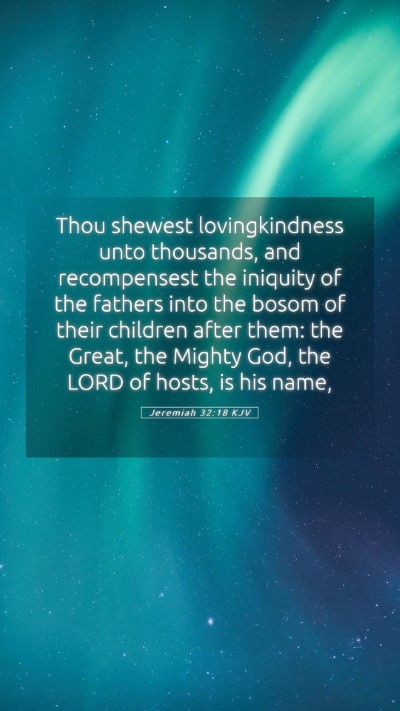Understanding Jeremiah 32:18
This article aims to provide a comprehensive understanding of Jeremiah 32:18 by examining various public domain commentaries and offering insights into its significance and meaning.
Verse Overview
The verse states: "Thou showest lovingkindness unto thousands, and recompensest the iniquity of the fathers into the bosom of their children after them: the Great, the Mighty God, the LORD of hosts, is his name."
Bible Verse Commentary
This verse highlights God’s nature as a loving and just deity, addressing the themes of mercy and retribution, and understanding these can enhance our Bible study insights.
Matthew Henry's Commentary
Henry emphasizes the dual aspects of God's character illustrated in this verse. He notes that while God is merciful, showing lovingkindness to thousands, He is also just and must recompense iniquities. This suggests that God’s justice is as significant as His mercy, affirming His authority in Biblical exegesis.
Albert Barnes' Commentary
Barnes elaborates on the “lovingkindness” of God, recognizing that it is extended to those who follow Him. He interprets the notion of recompense as a warning of the consequences of sin, affecting generations. This emphasizes the importance of understanding Scripture alongside God’s covenants.
Adam Clarke's Commentary
Clarke provides insights into the terms used in this verse, explaining that God's “lovingkindness” encompasses not only affection but covenant loyalty. He also discusses implications for the descendants of those who sin, shedding light on how individual actions have far-reaching effects.
Bible Verse Interpretations
The complexity of this verse invites various interpretations:
- God's mercy: The phrase "lovingkindness unto thousands" speaks to God’s character as one who is compassionate and desires reconciliation.
- Generational consequences: The recompense of iniquity highlights that the actions of one generation can impact the next, prompting reflection on the importance of righteousness.
- The majesty of God: The titles "Great" and "Mighty God" remind believers of His power, invoking awe and respect.
Scripture Analysis
Analyzing the historical context of this verse allows for a deeper understanding:
- Context of the exile: Jeremiah prophesied during a time of great turmoil for Israel, making his declarations crucial for a people facing judgment.
- God's unwavering nature: Despite Israel's disobedience, this verse reassures them of God's consistent character, which remains constant through trials.
Applying Bible Verses to Daily Life
Understanding Jeremiah 32:18 encourages personal reflection:
- Consider how the principles of lovingkindness and justice guide interpersonal relationships.
- Reflect on the legacy of our actions, fostering a healthy spiritual culture for future generations.
- Embrace the Greatness of God in everyday instances of mercy and justice.
Bible Cross References
This verse is related to several passages that deepen our understanding:
- Exodus 20:5-6: A parallel teaching on the consequences of sin impacting future generations.
- Deuteronomy 5:10: God's promise to show mercy to those who love Him.
- Psalms 103:17: Affirms God's lovingkindness is from everlasting to everlasting.
Conclusion
In summary, Jeremiah 32:18 serves as a profound reminder of the balance between God's lovingkindness and justice. Bible verse explanations such as those provided by Matthew Henry, Albert Barnes, and Adam Clarke illuminate this inner dynamic, enhancing our Bible verse understanding while encouraging believers to reflect on the broader implications of their actions.
For those engaged in Bible study groups or seeking online Bible study resources, this verse exemplifies the type of Bible study lessons that lead to deeper insight and personal growth.


